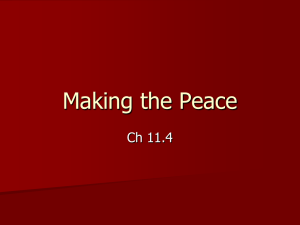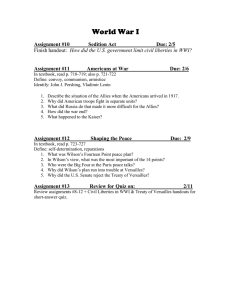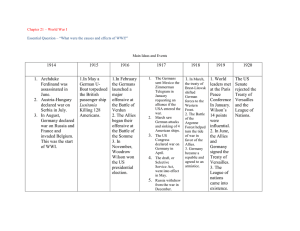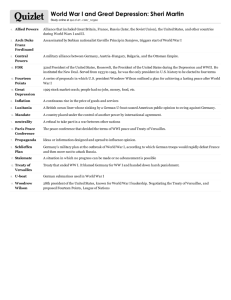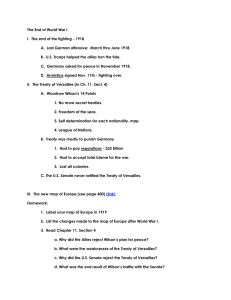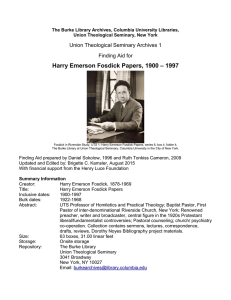Assignment: Disillusionment Name:
advertisement
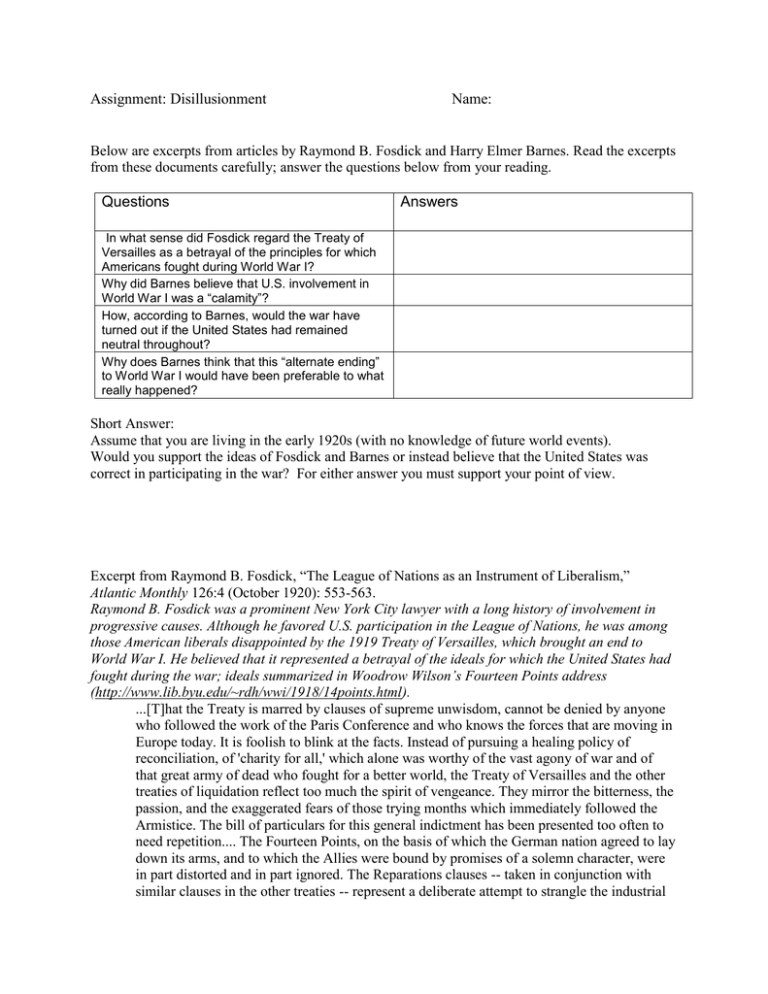
Assignment: Disillusionment Name: Below are excerpts from articles by Raymond B. Fosdick and Harry Elmer Barnes. Read the excerpts from these documents carefully; answer the questions below from your reading. Questions Answers In what sense did Fosdick regard the Treaty of Versailles as a betrayal of the principles for which Americans fought during World War I? Why did Barnes believe that U.S. involvement in World War I was a “calamity”? How, according to Barnes, would the war have turned out if the United States had remained neutral throughout? Why does Barnes think that this “alternate ending” to World War I would have been preferable to what really happened? Short Answer: Assume that you are living in the early 1920s (with no knowledge of future world events). Would you support the ideas of Fosdick and Barnes or instead believe that the United States was correct in participating in the war? For either answer you must support your point of view. Excerpt from Raymond B. Fosdick, “The League of Nations as an Instrument of Liberalism,” Atlantic Monthly 126:4 (October 1920): 553-563. Raymond B. Fosdick was a prominent New York City lawyer with a long history of involvement in progressive causes. Although he favored U.S. participation in the League of Nations, he was among those American liberals disappointed by the 1919 Treaty of Versailles, which brought an end to World War I. He believed that it represented a betrayal of the ideals for which the United States had fought during the war; ideals summarized in Woodrow Wilson’s Fourteen Points address (http://www.lib.byu.edu/~rdh/wwi/1918/14points.html). ...[T]hat the Treaty is marred by clauses of supreme unwisdom, cannot be denied by anyone who followed the work of the Paris Conference and who knows the forces that are moving in Europe today. It is foolish to blink at the facts. Instead of pursuing a healing policy of reconciliation, of 'charity for all,' which alone was worthy of the vast agony of war and of that great army of dead who fought for a better world, the Treaty of Versailles and the other treaties of liquidation reflect too much the spirit of vengeance. They mirror the bitterness, the passion, and the exaggerated fears of those trying months which immediately followed the Armistice. The bill of particulars for this general indictment has been presented too often to need repetition.... The Fourteen Points, on the basis of which the German nation agreed to lay down its arms, and to which the Allies were bound by promises of a solemn character, were in part distorted and in part ignored. The Reparations clauses -- taken in conjunction with similar clauses in the other treaties -- represent a deliberate attempt to strangle the industrial and economic life of Central Europe, reducing her to servitude for a generation. They leave the hundred million people of the beaten races, including Magyars [Hungarians] and Bulgar[ian]s, with no real hope for the future except through revenge, and no inducement to become willing members of a new system of peace. Austria, indeed, is reduced to impotence and penury, and a specific barrier is erected against the only measure that can save her from dissolution -- union with Germany. The Saar Valley settlement [in which France was given control over an area populated almost entirely by Germans] is an experiment of questionable validity, containing the seeds of probable future strife. The annexation by Italy of the Southern Tyrol [another area mainly inhabited by Germans] has nothing to justify it except military expediency. The inclusion within the limits of Czecho-Slovakia of three million Germans is a measure which, like the partition of Hungary and the international control of the rivers of Germany, cannot easily be defended. There are many points in the treaties which can be explained only on the basis of vindictiveness, bad judgment, and unwise compromise. Excerpt from Harry Elmer Barnes, “Balance Sheet of the First World War”: http://www.greatwar.nl/frames/default-barnes.html Harry Elmer Barnes (1889-1968), was a professor of history at Columbia University and one of the country’s leading historians. The following is an excerpt from an essay he wrote in 1939, entitled “The World War of 1914-1918.” It was generally believed in 1917 and thereafter that the intervention of the United States in the World War on the side of the Allies saved human civilization. It was lauded as one of the most noble and fortunate episodes in the history of man on the planet. Today, there is a great deal of skepticism about any such judgment. There is a tendency now to see in American intervention one of the major calamities in modern history—a calamity for the Allies and the United States as well as for the Central Powers. Let us assume the worst possible result of American neutrality in 1917-18. If we had not gone into the war the worst imaginable result would have been a German victory. But no sane person can very well conceive that the world would be any worse off today if the Germans had won under the Hohenzollerns. We used to picture the horrors of a Germany and a Europe dominated by the Crown Prince [William, son of the German Emperor William II] and his followers. But, compared to Hitler, Mussolini and Company, the Crown Prince and his crowd now appear to be cultivated gentlemen, urbane democrats, and sincere pacifists. A more warlike world than the present could hardly have been created as a result of German victory, and certainly the economic situation in Europe since 1918 would have been far better under a Europe dominated by monarchist Germany. But there is hardly a remote possibility that Germany would have won the war, even if the United States had not come in on the side of the Allies. Germany was eager to negotiate a fair peace arrangement at the time when [American newspaper owner] Roy Howard's "knock-out victory" interview with British war-secretary Lloyd George put an end to all prospect of successful negotiations. We now know that the Lloyd George outburst was directly caused by his assurance that the United States was surely coming in on the side of the Allies. Had President Wilson remained strictly neutral, there is little doubt that sincere peace negotiations would have been actively carried on by the summer of 1916. There is every reason to believe that the result of American neutrality throughout the European conflict would have been the "peace without victory," which Woodrow Wilson described in his most statesmanlike pronouncement during the period of the World War. We would have had a negotiated peace treaty made by relative equals. This would not have been a perfect document but it would certainly have been far superior to the Treaty of Versailles. Had we remained resolutely neutral from the beginning, the negotiated peace would probably have saved the world from the last two terrible years of war. Whenever it came, it would have rendered unnecessary the brutal blockade of Germany for months after the World War, a blockade which starved to death hundreds of thousands of German women and children. This blockade was the one great authentic atrocity of the World War period. In all probability, the neutrality of the United States would also have made impossible the rise of Mussolini and Hitler—products of post-war disintegration —and the coming of a second world war. Not only was our entry into the World War a calamity of the first magnitude for Europe and contemporary civilization, it was also a serious disaster for the United States. During the first Wilson administration an impressive program of social reform had been introduced, widely known as "The New Freedom." Had this continued until March, 1921, enormous and permanent improvements might have been made in the political and economic system of the United States. But when Wilson allowed himself to be slowly but surely pushed into war, the New Freedom perished overnight. Reaction and intolerance settled down on the country. Some of those who had earlier warmly supported Wilson's domestic policies were thrown into prison, and many others were bitterly persecuted.
